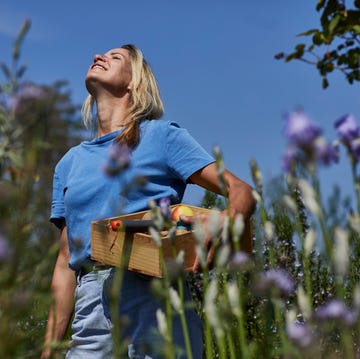I still feel butterflies in the pit of my stomach when the phone rings. No matter how many calls you take, you an never predict who's going to be on the end of the line. By the end of a morning's shift, I've probably offered practical support, referred someone to our counselling service and simply provided another person with a verbal hug. Taking two hours out of my day can often make the world of difference to someone who needs a helping hand.
I started looking into volunteering when I retired. I’d had a busy career as an IT project manager and was ready to enjoy some travelling with my husband, Terry, and spending more time with my family. I was looking to keep my brain ticking over, but needed something that could fit around my new phase of life. That’s what drew me to FamilyLine, a phone line for adults needing practical support or a friendly ear to listen to their worries.
Most enquiries are by phone, although people can also chat over text message, webchat or email. Volunteering shifts can be as little as an hour, and you can book them up to a month in advance. I tend to do two-hour slots twice a week, answering calls from home in Sheffield.
I joined FamilyLine in 2022, after a training period that involved a mix of group and one-to-one online classes, where we learned about the common types of calls to expect and how to support people in different situations. Safeguarding issues are the most serious cases, which involve a caller who may be at immediate risk of harm. I’ve only ever had two such calls, and one of them happened to be my very first call.
I answered the phone to a woman in distress as her partner had been physically abusive before he'd run out of the house. I tried to reassure her and provide practical steps provide practical steps: was anyone else home? Had she locked all of the doors? Could she put the key in the lock to prevent him getting back in? Then I encouraged her to ring the police, who came to assist her.
People often ask me what a typical call is like, but no two are ever the same. I may have one lasting five minutes, followed by another that takes over an hour. We have people from every walk of life and with all sorts of problems seeking help.
I tend to volunteer on Monday mornings, which is one of the busiest periods for calls, as issues can build up over the weekend. Although I take the calls from home, being in contact with other volunteers via the internal messaging board helps me feel part of a team. Everyone has different life experience and expertise, so there’s a wealth of advice to tap into.
When I joined, I hoped I’d be able to provide clarity around dementia care and the associated legal processes, such as power of attorney, as I’d been through it when my brother, Gordon, was diagnosed with early-onset dementia. Other volunteers have their own specialisms – but there are no requirements for volunteers to have specialist knowledge; we just need kind, patient people willing to lend an ear.
I feel good when I deliver the information someone needs or when they say they feel better after talking things through with me. Volunteering also gives me focus in my life. I like being kept on my toes and was determined not to fade into oblivion when I retired. I truly believe I’m part of something important and that’s such a great feeling.
How to volunteer with FamilyLine
What is FamilyLine?
FamilyLine offers emotional support as well as practical guidance. A network of volunteers offer support over the phone and via texts, webchat and emails – and you don’t need specialist experience to become one of them.
How often do I need to volunteer?
Shifts can be as little as one hour, with a standard commitment of two hours a week. You can sign up for shifts that work around your schedule, and ideally you’ll be able to volunteer for at least a year after signing up.
What training will I receive?
All training is provided, with three, three-hour group sessions and three, one-hour individual sessions, which take place online. There are also e-learning courses, which can be completed over six months.
To apply, visit family-action.org.uk/volunteer














